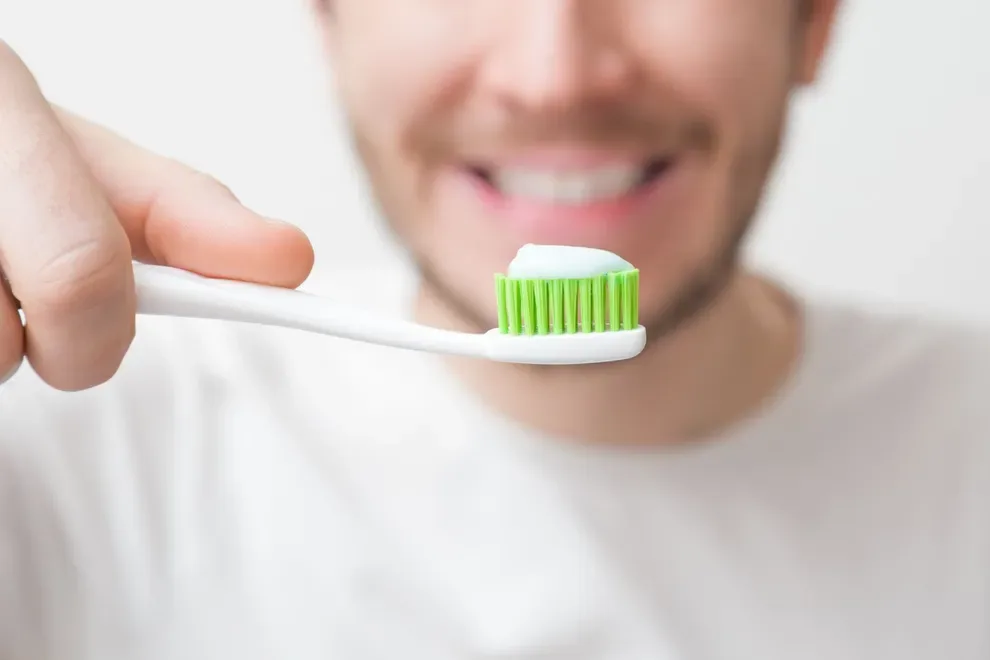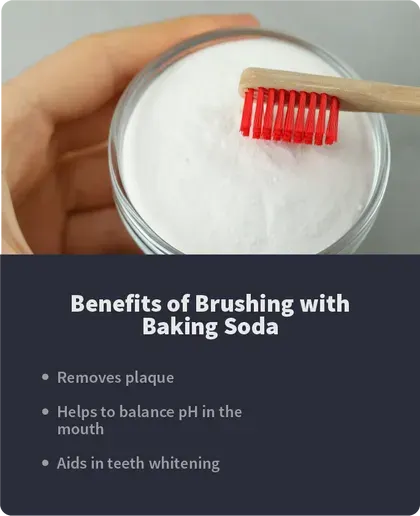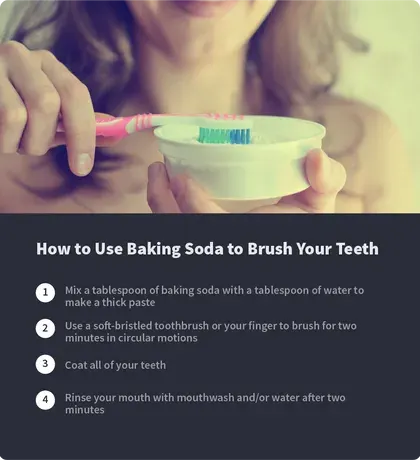Brushing Your Teeth With Baking Soda: Is It Safe?

Table of Contents
- Pros & Cons of Brushing with Baking Soda
- Plaque Removal
- Demineralization Properties
- Teeth Whitening & Baking Soda
- How to Whiten Teeth
- Is It Safe?
- How to Use & Brush
- References
There are many reasons people are brushing their teeth with baking soda, such as these:
It is a mild abrasive.
Baking soda helps to remove plaque.
It can help to balance the pH in your mouth.
Baking soda can aid in whitening your teeth.
Baking soda can be effective and safe for these purposes when used properly. Often, people tolerate products containing baking soda, such as toothpaste, better than baking soda by itself.
Pros & Cons of Brushing your Teeth with Baking Soda
Like many dental care options, brushing your teeth with baking soda has some benefits and some disadvantages.
Pros of brushing your teeth with baking soda include the following:
Cost: Baking soda is very inexpensive.
Convenience: Many people have baking soda in their homes. It’s also available from most grocery stores and drugstores.
No hidden ingredients: Baking soda doesn’t contain any artificial colorings or additives.
Naturally antibacterial: Baking soda disinfects and has antimicrobial properties.
Proven effective: Research indicates that baking soda reduces plaque in the mouth.
Many oral health benefits: In addition to reducing plaque, baking soda may help to balance PH levels in the mouth, promote healthy tooth enamel, and remove stains.
Easy to incorporate: There are many DIY options for using baking soda on teeth, including mouth rinses and pastes. Many over-the-counter products also include baking soda, and products containing baking soda have been shown to be effective.2
Gentle enough to treat cancer-related oral problems: Baking soda rinses are often recommended for helping to soothe and treat mouth sores and other oral health problems associated with chemotherapy and cancer.
Safety: Baking soda is considered generally safe for use in oral care.
Cons of brushing teeth with baking soda the following:
Doesn’t have fluoride: Most dentists recommend using a fluoride toothpaste as part of your oral care routine in order to fight cavities and decay.
Limited effectiveness: When used alone, baking soda may not be as effective as other options. Many dental products include advanced ingredients to target specific conditions (like gum health or whitening, for example). While baking soda can promote oral health and reduce plaque, there may be other products that are more effective in meeting your needs.
Abrasiveness: Baking soda is generally considered safe and gentle, but it’s still an abrasive product that might not be suitable for everyone or everyday use.
Baking Soda for Plaque Removal

Bacteria forms on teeth after eating and can lead to the buildup of plaque. Plaque can be broken down and removed from teeth by brushing your teeth regularly. Baking soda, or sodium bicarbonate, is a mildly abrasive substance that can be effective at removing plaque from your teeth.Baking soda is effective in removing the plaque biofilm from the teeth, research shows. It is also inexpensive, easy to find, and therefore easily accessible as a tool for plaque removal to help prevent tooth decay.
Demineralization Properties of Baking Soda on Your Teeth
Carbohydrates in foods can change the pH level in your mouth, creating an acidic environment that can lead to demineralization of your teeth. In turn, this can cause the enamel to erode. The more minerals your teeth lose, the more likely you are to get a cavity, which is when the enamel in the teeth is irreversibly damaged.
Baking soda can help to balance and reverse the acidic pH level in your mouth and therefore aids in preventing this demineralization process. It has basic properties that can counteract the acids that contribute to the loss of minerals on your teeth created by foods you eat.
Oral products containing hydrogen peroxide whiten your teeth by oxidizing stains on the surface of your teeth.
Teeth Whitening & Baking Soda
Many foods and drinks, such as coffee and wine, can stain your teeth. There are numerous methods and products on the market for whitening your teeth for cosmetic purposes. Many of these products contain baking soda, as it has been shown to aid in stain removal and teeth whitening.
There are more effective methods of whitening your teeth than using baking soda, studies show.1 These include dental office treatments and specialized products and toothpastes.
How to Whiten Teeth with Baking Soda
If you are still interested in whitening your teeth with baking soda, you might consider the following:
A DIY baking soda mouthwash: Mixing one cup of filtered water and about four teaspoons of baking soda and a few drops of peppermint essential oil in a sterile jar will provide you with a safe baking soda mouthwash. Use about two tablespoons at a time, and check with your dentist before use.
A DIY baking soda toothpaste: Add this into your care routine while still using a fluoride toothpaste as your primary product. An easy recipe is one tablespoon of water and one tablespoon of baking soda, mixed into a paste and gently applied to every area in the mouth. Rinse thoroughly after two minutes.
Other products: Choose an over-the-counter whitening product that includes baking soda as an active ingredient and is approved by the American Dental Association (ADA).
Safety of Baking Soda & Your Teeth
For the most part, baking soda is considered safe and low abrasive, which means that it is safe to use on your teeth. That being said, it is still an abrasive substance, and it can lead to enamel erosion with time. Baking soda needs to be used with caution, and it shouldn’t be used every day. There are a lot of products on the market today, many of which contain baking soda, that can be better options for daily and regular use.
How to Use Baking Soda to Brush Your Teeth
When using baking soda to brush your teeth, it is recommended to not use it more than once per week. To use baking soda to brush your teeth, follow these steps:

Mix a tablespoon of the powder with a tablespoon of water to make a thick paste.
Use a soft-bristled toothbrush or your finger to brush for two minutes in circular motions.
Coat all of your teeth.
Rinse your mouth with mouthwash and/or water after two minutes.
Talk to your dentist about the best tooth care routine for your teeth and whether or not baking soda is a good fit for you.
